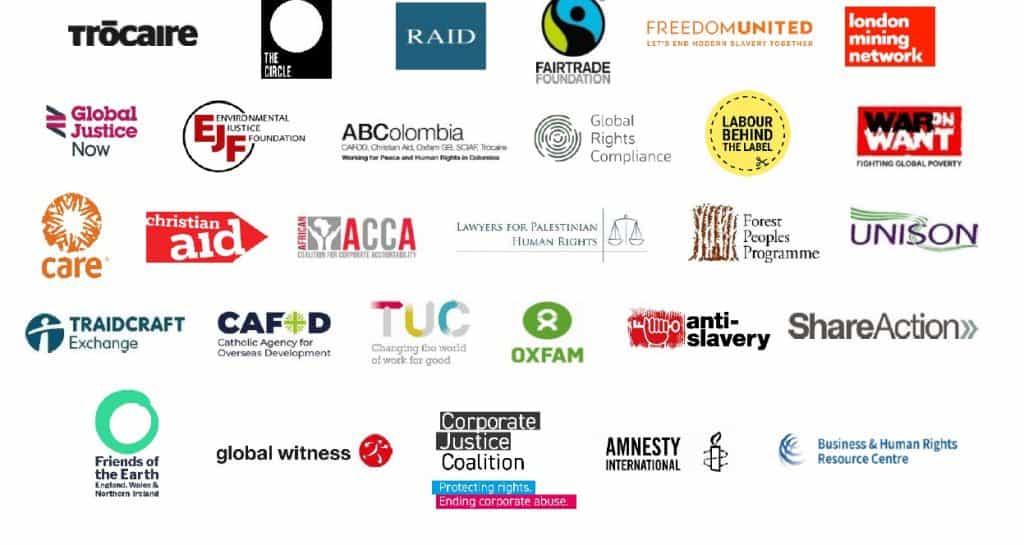
A decade ago this month, the United Nations Human Rights Council unanimously welcomed the UN Guiding Principles on Business and Human Rights (UNGPs).
The UNGPs set out an authoritative framework for state duties and business responsibilities towards fulfilling human rights. They highlight the essential role that access to remedy can play in providing justice to those affected by corporate abuses. They also set out the need for a “smart mix” of policies, including mandatory measures, to meet these aims.
The ten-year anniversary of the UNGPs serves as a milestone to reflect both on what has and what has not been achieved. This must include the over-emphasis placed by states and businesses alike on voluntary approaches to tackling business abuses of human rights in corporate groups and supply chains. To close this gap, the UK must introduce its own mandatory requirements for businesses to respect all human rights.
Systemic, persistent human rights abuses and environmentally destructive practices are commonplace in the global operations and supply chains of UK businesses. Marginalised groups such as women, indigenous peoples, children and migrant workers, among others, are disproportionately impacted and UK consumers become complicit in buying goods and services tainted by human rights abuses through no fault of their own.
It is high time that the UK implemented its own mandatory requirements for businesses to respect all human rights. The UK was the first country to develop a ‘Business and Human Rights National Action Plan’ based on the UNGPs and one of the first to pass a domestic supply chain law, in the form of S.54 of the Modern Slavery Act. However, it is now widely accepted the S.54 is not fit for purpose to prevent forced labour abuses and modern slavery
in supply chains – against the backdrop of the G7, led by the UK, explicitly committing to eradicate “the use of all forms of forced labour in global supply chains”.
Our Coalition, which spans NGOs, trade unions and law firms, is calling on the UK government to urgently introduce a new UK law to hold companies to account when they fail to prevent human rights abuses and environmental harms.
This law should mandate companies – across all sizes and sectors, including financial organisations – and the public sector to undertake ‘human rights and environmental due diligence’ across their supply chains. While accountability mechanisms for the public sector and private sector should be different, public procurement spending must align with the state duty to protect human rights in supply chains, shaping demand and driving business to respect rights.
A new UK law should be based on the world-leading ‘failure to prevent’ liability provisions of the 2010 Bribery Act – as already called for by Parliament’s Joint Committee on Human Rights and confirmed as legally feasible by the British Institute of International and Comparative Law. Crucially, such a law would consolidate significant, recent advances in English common law, for example, in the Supreme Court cases Lungowe v Vedanta and Okpabi v Shell.
While welcome, the Government’s deforestation due diligence mechanism in the Environment Bill notably fails to comprehensively include human rights. Specific recommendations from the UK Government-convened Global Resource Initiative taskforce call for combined human rights and environmental due diligence, but this combined due diligence approach is notably absent from the Bill.
A new law would also ensure the UK is in step with other countries introducing new corporate accountability laws incorporating mandatory due diligence. As the EU moves forward with its proposal to place new due diligence obligations on all companies operating in the Single Market, the absence of strong UK domestic legislation means that the UK will immediately fall behind the EU on human rights and environmental protections. This will create a confusing patchwork of regulations and an uncertain landscape for businesses. Companies in the UK which are operating in the Single Market would be obliged to follow mandatory human rights and environmental due diligence laws, while those outside it would not.
A new UK law is vital to ensure the delivery of the Sustainable Development Goals, it will help reverse the devastating consequences of unchecked corporate impunity for human rights abuses and in doing so meet G7 commitments to ensure respect for human rights. It would align the UK to an emerging international consensus on these issues, help to deliver a meaningful ‘Global Britain’ vision and should be a central element of a package of measures required to achieve a global green transition and a just recovery from the COVID-19 crisis.
